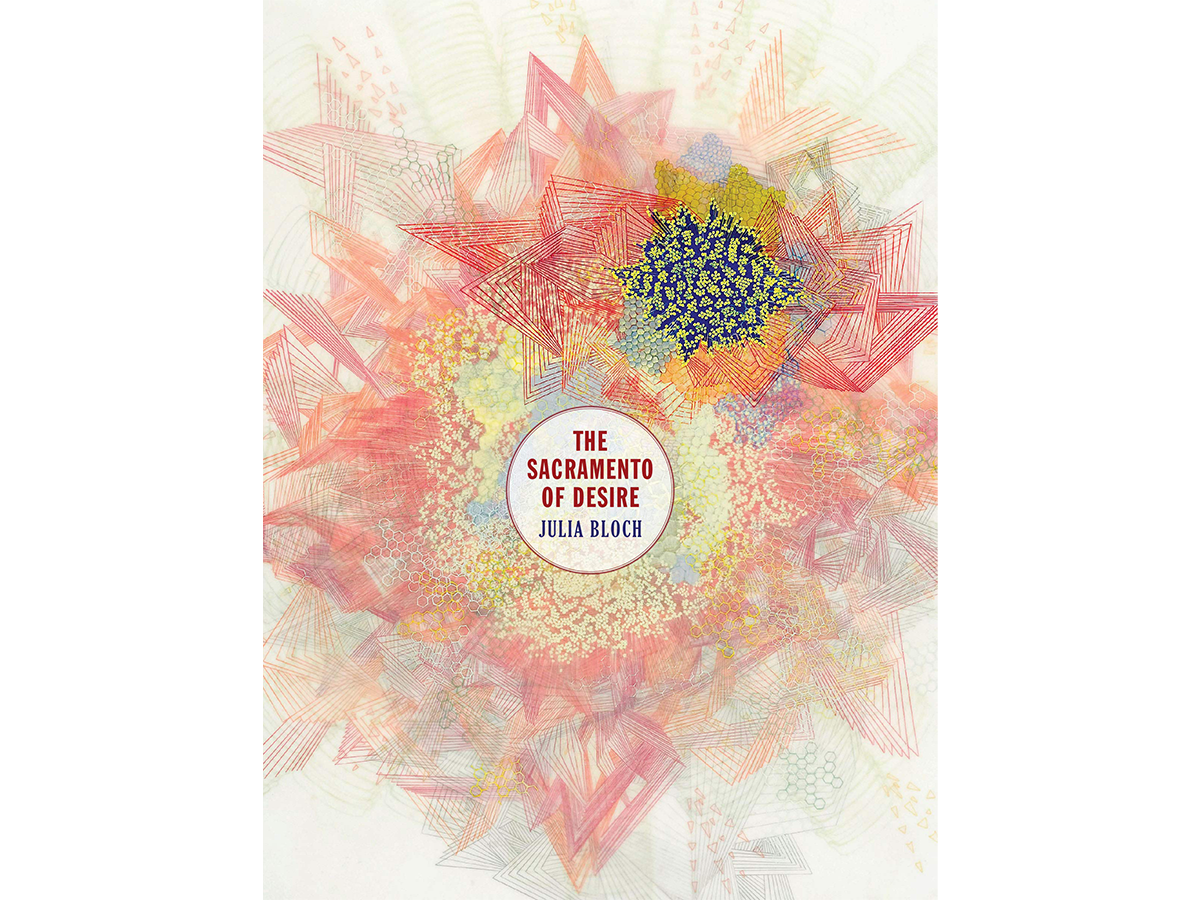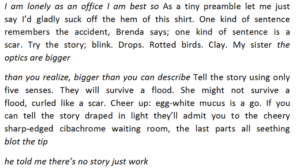One way into The Sacramento of Desire by Julia Bloch is to see it as a rich, rough braid of echoes. Many are there on purpose. A river of words, ideas, and lines from upward of 100 other writers and speakers runs through it. About 80 are name-checked in the “Notes,” from William Shakespeare to Lorine Niedecker, Walt Whitman to Jessica Hagedorn, Christina Rosetti to Claudia Rankine. Many first names appear in the text, too, as though they are names of friends, members of a community: “Jessica says she’s the queen of chaos. Jessica says she’s a cheerful fatalist.”
Sacramento of Desire seems to arise from a sense of community, of other voices running around, before, behind, their words and phrases firing by themselves or igniting new moments. It is largely a queer community, forming a safety cordon for explorations of new viewpoints, especially regarding time, how we see it, feel about and live in it. More on that presently.
With an M.F.A. from Mills College and a doctorate from the University of Pennsylvania, the much-awarded Bloch directs the Creative Writing Program at Penn. Most of her new book is devoted to the title sequence, 66 fully justified blocks of text that begin and end with italicized phrases that appear to connect with what either precedes or succeeds in playful and surprising ways:
A lot of plates are spinning on a lot of broomsticks in poetry like this. Let me toy with just a few. Much of Sacramento of Desire invokes reproduction, understood a lot of different ways. Bloch is reproducing other voices, repurposing them, weaving them—so there’s one way. There’s much anxiety over the act of writing itself, glimpses of the physical place where “I” write, the hazards of writing (blotting the tip of a fountain pen, perhaps), what “kinds of sentences” do (“Brenda,” by the way, is named as Brenda Hillman in the “Notes”), how to “tell the story.” So there’s another way.
In poems much concerned with “optics,” we encounter issues with the reproduction of images. Cibachrome is a color printing technique used mostly on polyester surfaces. Plastic is constantly referenced, the edge of a polyester photographic sheet, maybe, or the plastic of which many medical and surgical instruments are made.
That brings up human reproduction, and the quest to reproduce. It turns out that this is a field of battle. A piece titled “Ovulept” acts as prologue to the entire book. The word is Bloch’s coinage for the institutional attempt, as I take it, to seize biological, organic time and conform it to humanly arranged systems and markers, by “thwarting, mediating, stalling, or occluding via market-based postures toward temporality.” Among much else, the body is an irrational, evolutionarily arising system of organs, tissues, and liquids. Against this is the calendar, a kind of writing that marks and “times” things that really are, in Bloch’s beautiful phrase, “measured by the slipping of a tiny bleeding object … by a liquid sunset.”
Sacramento thus runs with blood, salt, mucus, cells, tissues, infections, syringes. We’re measuring the color and stringiness of mucus because we want to know when we’re fertile, when chances are best. Tension throbs between time as it happens in nature/the organism/“me” and “timing,” the institution of “telling” what time it is: “The charts are numbered according to the civil calendar but the pillars are actually lunar, and see there’s a crystal in the lung because the moon always wins.” One speaker says she can’t “chart some sort of ‘launch’ as if futures were engraved.”
The launch; the plot (in stories, movies, political conspiracies); the promise … in a world “completely waiting for technology to get right down to the center of experience,” the problem is, as always, that this “center” is imaginary. Meantime, the universe does what it does. Even the notion of a cycle is imaginary, since “cycles frequently burst into variegated lines.”
I was reminded, reading Sacramento, of the work of José Esteban Muñoz, especially his writings about queer futurity. I’ve been drawn to his suspicion of “normal,” majority-imposed ways of seeing and feeling time. For him, to be queer was to feel that the present-as-structured is not enough, and so queerness involves existing, feeling, performing, and creating in ways that have not yet arrived, always in a future not yet here. His was a potent teaching that was half frustrated protest and half heady idealism. As Bloch puts it, “seeing is a form of wanting”—which could carry us back to the title of the book and its main sequence.
Bloch conjures brilliantly with the tyranny of contracts (including the writer-reader contract, maybe), the violence within normative language, the “forms of policing” we don’t even know we consume, ways of talking and writing that are categorical, stretching toward certainty, toward total, original, finished gestures (“We all want to be new, we all want to be finished”), fixed statements, completed declarations. A monumental reply comes on page 63, an explosive list of alternative metaphors in the poems of others.
The main sequence is followed by “Intramural,” which interlayers quotations from interviews with anonymous sperm donors (in italics) and language from Bloch’s archives. Grammar (as an institution) seems to stalk the poems. Grammars (in everything from writing to civic life) reflect long histories of choice and selection, yet they come to us readymade, terrifying indeed, since we all are grammar consumers, “So that this recapitulated grammar might leak into the corridor of my own thought.” I might add that the interview quotations – “My shyness disappears once I am on the court” or “I can definitely keep a beat” – are inevitably hilarious.
The closer is “Goodbye Aspen,” a musical coda and summary of themes:
Future’s
Oversaturated. Sentences
like fat. Oh. Here
it comes again, breath
and jars and cells
and vials and needleless
syringes, two big
bleeds then one small
one, absent all the
clear plastic …
Sacramento of Desire invites us to hang out as Bloch weaves—and to get woven in ourselves. Much of it may strike some readers as academic or impersonal, but after a couple of readings, I felt delightfully, instructively perplexed and transfixed, thinking and feeling in many directions, yet also feral and wounded, drenched in the fluids of others. Maybe that baptism is the point.
The Sacramento of Desire
by Julia Bloch
Sidebrow
Published on February 15, 2020
93 Pages

John Timpane, the former Books Editor and Theater Critic for the Philadelphia Inquirer, is a retired English teacher and journalist living and working in New Jersey. His work has appeared in Sequoia, North of Oxford, Apiary, Painted Bride Quarterly, Schuylkill Valley Journal, Per Contra, Vocabula Review, Truthdig, and elsewhere. His latest book, a chapbook, is Buck in the Piano Room (Philadelphia: Moonstone Press).

